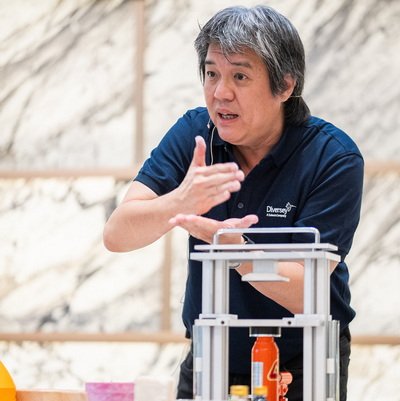ไดเวอร์ซี่ ไฮยีน (ประเทศไทย) และชมรมผู้บริหารงานแม่บ้านแห่งประเทศไทย ร่วมมือพัฒนาแนวปฏิบัติเพื่อส่งเสริมการดำเนินงานของโรงแรมและภาคบริการการท่องเที่ยวอย่างเป็นมิตรต่อสิ่งแวดล้อม เพิ่มขีดความสามารถในการแข่งขันและอนาคตที่ยั่งยืนให้ธุรกิจโรงแรมและการท่องเที่ยวไทย
ไดเวอร์ซี่ – บริษัทในเครือโซเลนิส คิดค้นโซลูชั่นการทำความสะอาดที่เป็นมิตรต่อสิ่งแวดล้อมใหม่ๆ และแนวทางสำหรับภาคการดูแลทำความสะอาดโรงแรมในประเทศไทย ด้วยผลิตภัณฑ์ในการทำความสะอาดที่เป็นมิตรต่อสิ่งแวดล้อม ที่ได้รับการรับรองด้านสิ่งแวดล้อมในระดับสากล และบรรจุภัณฑ์ที่ลดการใช้พลาสติก และยังใช้ระบบอัตโนมัติในการทำงานเพื่อเปลี่ยนผ่านสู่ระบบดิจิทัลให้มากขึ้น ทำให้เกิดการวัดผลการดำเนินงานอย่างยั่งยืนสู่การเป็น Green Hotels เป็นกุญแจสำคัญสู่การลดมลพิษ ประหยัดพลังงาน และลดต้นทุน สร้างภาพลักษณ์ที่ดี และเพิ่มขีดความสามารถในการแข่งขันให้เติบโตอย่างยั่งยืน เพื่อตอบสนองความต้องการของลูกค้า นักท่องเที่ยวและนักเดินทาง มักจะเลือกจุดหมายปลายทางที่ได้รับการรับรองภายใต้มาตรฐานสิ่งแวดล้อมสากล เช่น Green Globe, Green Key, EarthCheck เป็นต้น

นอกจากนี้นวัตกรรมเทคโนโลยี เช่น บรรจุภัณฑ์และสารเคมีที่สามารถย่อยสลายได้ทางชีวภาพ การรีไซเคิลและการอัปไซเคิล ที่จะช่วยให้งานบริการของธุรกิจโรงแรมสามารถเปลี่ยนผ่านไปสู่ความยั่งยืน อีกทั้งยังร่วมสร้างคุณค่าร่วมเพื่อชุมชนและสิ่งแวดล้อมผ่านองค์กรการกุศล เช่น การทำสบู่ก้อนใหม่จากสบู่ที่ใช้แล้ว ภายใต้โครงการ “Soap For Hope™” การนำผ้าปูที่นอนที่ไม่ใช้แล้วมาทำเป็นกระเป๋าผ้า ตุ๊กตา หน้ากากอนามัย และอื่นๆ ในโครงการ “Linens For Life™” โครงการ “CoffeeBriques” ซึ่งเป็นการรีไซเคิลกากกาแฟที่ใช้แล้วนำมาทำเป็นถ่านหุงต้ม และการเปลี่ยนขยะพลาสติกให้กลายเป็นวัสดุก่อสร้างเป็นมิตรกับสิ่งแวดล้อมทดแทนหิน ทราย หรือกรวด เพื่อการสร้างถนน พื้น และสนามแบดมินตัน ในโครงการ “PlasticShreds” เพื่อชุมชน
“โครงการเหล่านี้ไม่เพียงแต่ช่วยให้โรงแรมสามารถลดขยะ แต่ยังช่วยเหลือชุมชนเปราะบางให้สามารถมีรายได้” Dr. Stefan Phang ผู้อำนวยการฝ่ายความยั่งยืนและการสร้างคุณค่าร่วมชุมชน สังคมและสิ่งแวดล้อม บริษัทโซเลนิส อธิบายพร้อมสาธิตการทำสบู่ก้อนใหม่และถ่านหุงต้มจากกากกาแฟ ให้แก่สมาชิกชมรมฯ ในงานวันเสาร์ที่ 27 เมษายน 2567

คุณอัมพิกา มีทิพย์ ประธานชมรมผู้บริหารงานแม่บ้านแห่งประเทศไทย กล่าวในงานว่า “งานทำความสะอาดโดยใช้ผลิตภัณฑ์ที่เป็นมิตรต่อสิ่งแวดล้อม และมีการบริหารจัดการขยะที่ดี ช่วยลดผลกระทบด้านสุขภาพและสิ่งแวดล้อม ลดการสร้างขยะโดยการ ลดใช้ นำกลับมาใช้ซ้ำ และรีไซเคิล เพื่อโรงแรมสะอาด โลกสะอาด”
“เราต้องทำในส่วนของเราเพื่อร่วมกันรักษ์สิ่งแวดล้อม เพราะโลกมีเพียงใบเดียว” Karel Van Corp รองประธานฝ่ายการตลาดสำหรับประเทศตลาดกำลังพัฒนาและรองประธานฝ่ายแบรนด์ผู้บริโภคระดับโลกบริษัทโซเลนิส
Diversey and Thailand’s Hotel Housekeepers Push For More Sustainable Practices
More environmentally friendly chemicals, new technologies and a raft of upcycling innovations are being increasingly used behind the scenes in Thailand’s hotel sector
Diversey Hygiene (Thailand) and the Executive Housekeeper Association of Thailand (EHAT) have joined forces to advance better sustainable practices in Thailand’s hotel sector.
Many relatively harmful chemicals from hotel and resort wastewater pipes are still being deposited in the surrounding ecosystems. Detergents that are not biodegradable or non-environmentally friendly such as alkylphenol ethoxylates (APEOs) are still used in many of Thailand’s hotels. APEOs (CAS 9016-45-9) is an endocrine-disruptor, and it interferes with estrogen levels in aquatic settings receiving wastewater. It has been banned in the European Union and several other countries around the globe.
“If it’s not good for Amsterdam, why is it good for Bangkok? If it’s not good for Geneva, it shouldn’t be good for Krabi or anywhere,” said Dr Stefan Phang [pictured], Solenis’s Director of Sustainability and Creating Shared Value. He was addressing media, housekeepers and students at a sustainable housekeeper industry briefing 27 April 2024 in Bangkok.
Diversey (a Solenis company) and the Executive Housekeeper Association of Thailand were making the case for better sustainable practices in Thailand and beyond.
The objective, said Diversey speakers, was not to just be compliant with regulations in mature markets such as the EU, USA, Australia and Japan, but to go further to help the environment and gain competitive advantage.
The way ahead for Thailand’s hotel housekeeping sector is to embrace green products and international environmental certifications, use less plastic, and adopt automation and digitisation for more accurate measurements, speakers said.
EHAT and Diversey explained that the housekeeper support sector is full of innovation, such as cleaning without chemicals using diamond dust.
Supported by EHAT, Diversey has launched additional technical innovations that have a community-support element as well as an environmental one. For example, Diversey is encouraging the recycling of hotel soaps, with its Soap For Hope initiative. It is also converting end-of-life hotel linens into cloth bags, dolls and face masks in its Linens For Life programme.
Other innovations include CoffeeBriques, which recycles spent coffee grounds into coffee charcoal briquettes for cooking fuel. In addition, the company has technology to transform plastic waste into construction materials as a substitute for stone, sand, or gravel, such as for badminton courts and roads, under its PlasticShreds initiative.
“These initiatives not only help hotels reduce landfill waste but also enable vulnerable communities to earn a modest but sustainable income,” Phang explained. He demonstrated these projects to EHAT members at the 27 April 2024 event.
Diversey said its objective was to innovate new environmentally friendly cleaning solutions to deliver effective, high-quality, and sustainable industry outcomes in Thailand.
Once that is done, hotels can then achieve international sustainability certifications such those issued by Green Globe, Green Key, EarthCheck, and the Hospitality Sustainability Basics global standards. These are increasingly demanded by tour operators in EU and other affluent source markets that send tourists to Thailand’s hotels.
Ms Ampika Methip, President of the Executive Housekeeper Association of Thailand told the meeting: “We need hotels to use greener products and have better waste management by reducing, reusing and recycling and doing things like banning single use plastic.”
“We only have one world and we have to do our share,” said Karel Van Gorp, Solenis’s Vice President of Marketing for Emerging Markets.




